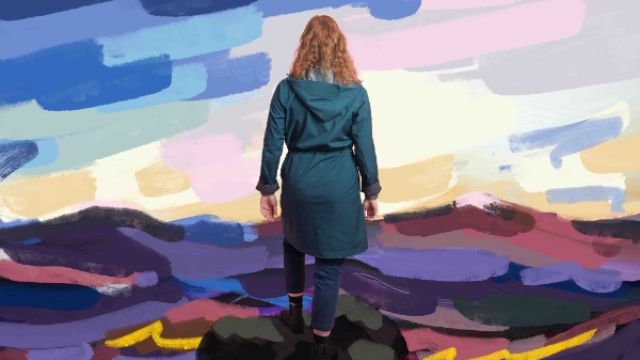After Hero
‘Where is it written what am I supposed to be?’ It’s a key line here and it recurs. It’s the key question in a play about identity and roles – gender and otherwise. In their joint program note, Jessica Bellamy and Jean Tong tell us, “This is a work for everyone who is tired of the same old stories, because we are too.’
By ‘the same old stories’, we guess they mean those neat, clear-cut tales in which there is a hero who triumphs. So, they go on to explore the question: what is a ‘hero’? How is he or she defined? What are his or her necessary qualities? These are the questions of Act One, written by Jean Tong, a stylised, almost ritualistic opening ‘movement’, so to speak.
A sharply individual character (Wolfie Sun) resists the demands of heroism or, more exactly, resists the confining definition of what a hero is – and the demands made on heroes. Other cast (Laura Aldous, Courtney Beaumont, Alfred Kouris, Olivia Staaf and Talia Zipper) surround our ‘hero’, demanding, hectoring, contradicting. They want a hero, but a hero must fit the concept of what a hero is! As Brecht says in Galileo, ‘Unhappy the land that needs a hero.’ (It’s particularly apt in our present context of continual debate about ‘leaders’ and how we need one, and how simplistic ideas are about what a ‘leader’ is.)
Here director Daniel Lammin moves his cast about the stage with a sharp eye, creating a threatening, claustrophobic mob that mocks and surrounds their unsatisfactory ‘hero’.
Jessica Bellamy’s Act Two changes style completely to broad comedy. Now we’re in an Eastern European shtetl, complete with deliberate clichés of chess players and a Talmud scholar, ridiculous beards and accents. Ms Bellamy riffs on Yentl, Barbara Streisand’s 1983 movie about a girl who disguises herself as a boy so as to enter religious training. Talia Zipper plays a version of the character – and steps out of character to tell us what she’s referencing here.
Here the young cast, all students at Monash Centre for Theatre & Performance, get to shine in individual performances. Olivia Staaf is brilliant and very funny as a cockroach (a reference to Kafka?), and Laura Aldous shines as a wry and very pregnant villager. Both these actors impress with a strong stage presence: they eye goes to them and is held.
The original author of Yentl, Isaac Bashevis Singer (played by Wolfie Sun) even arrives on stage to kvetch about what they’re doing to his work. But the thrust here is that everyone’s trying to emigrate to the ‘New World’ and each has her or his dream of the freedom they’ll find there – a naïve hope that is dashed – or will be: in the ‘New World’ too conditions apply, and each of them will still be defined there. Defined as something else but defined as ‘what they are supposed to be’.
So far, so good, but the pregnant woman describes their boat being pursued by smaller boats filled with men in uniforms… Then comes an announcement: the refugees will not be taken to the ‘New World’ but confined on ‘an island’. So… now we need a hero. This feels a bit inserted, a bit tenuous and opportunistic to me – and if one is to raise the issue of our refugees, is that enough? That is, to raise it in passing?
Act Three is a collaboration of Ms Tong and Ms Bellamy that returns to the mode of Act One: the poetic prose, the direct address to the audience and the cast speaking in unison. The last doesn’t always come off: at times the inexperienced voices blend rather too much, and meaning is lost, and, in any case, the text is over-dense with complex meaning. (One remembers the Chorus speaking in unison in the ancient Greek tragedies where what the Chorus has to say is always in simple language and as much a comment on the story as the story itself.)
Nicholas Sheridan’s set design is simple but suggestive – piles of books and a central ring of them provides the perfect reference to the central premise. Caitlin Duff’s lighting is most effective, particularly in Act One, enhancing the sense of menace. Paris Bella’s comic costume design in Act Two is well-judged excess, but I’m not so sure about Acts One and Three: the meaning of what look like tie-died shifts escapes me.
Despite the talent on stage – and the likely bright future that lies ahead for some in this cast – the collaboration between these two experienced but very different playwrights for me doesn’t quite gel. Yes, it’s fresh and energetic and it’s a piece that plays with styles and forms in an entertaining way. Mr Lammin has been ingenious in bringing out the theatricality and in realising the potential of the text and his cast.
The central idea of what we are ‘supposed to be’ is of course written down in many places. I think what Ms Tong and Ms Bellamy are asking is, where is it written down what I am supposed to be? That is, there’s a need to break out from or escape from the ‘old stories’ and to be what one is. But in the end, overall, we may feel that here there are many words in pursuit of not enough ideas – albeit worthy and important ideas perhaps but ideas raised or asserted and left undeveloped.
Michael Brindley
Subscribe to our E-Newsletter, buy our latest print edition or find a Performing Arts book at Book Nook.

